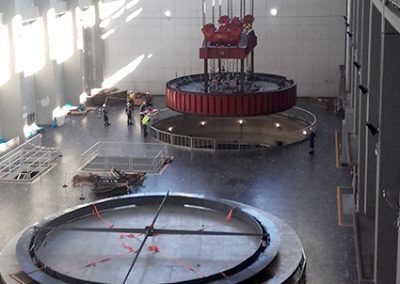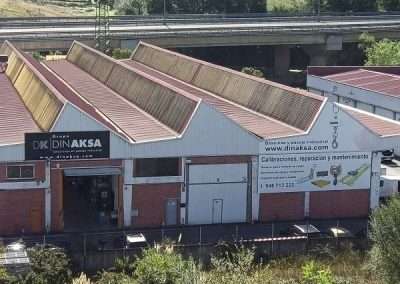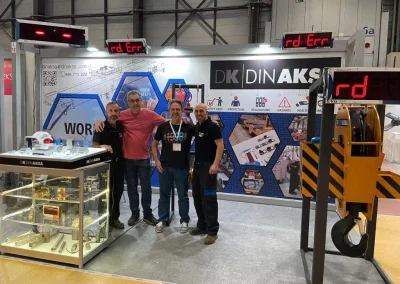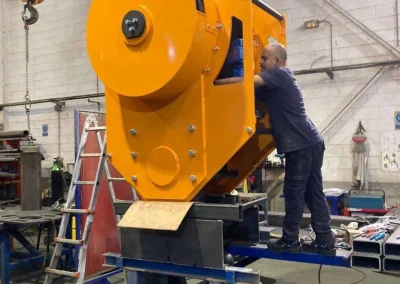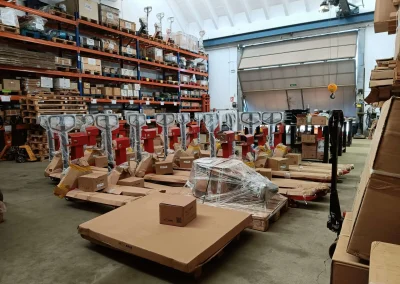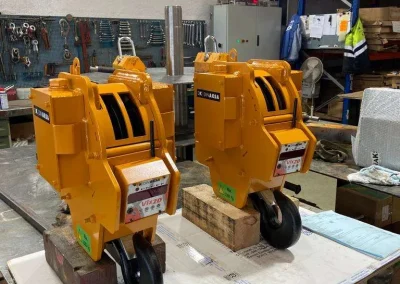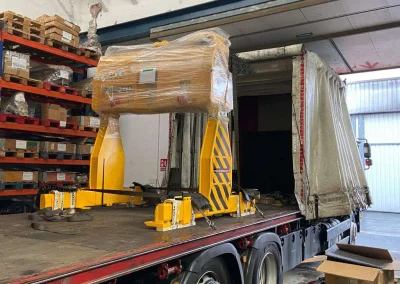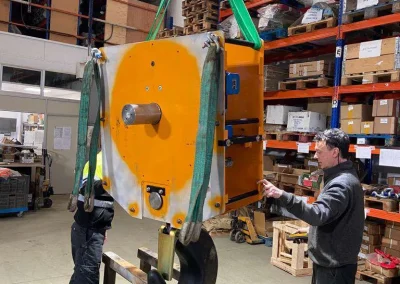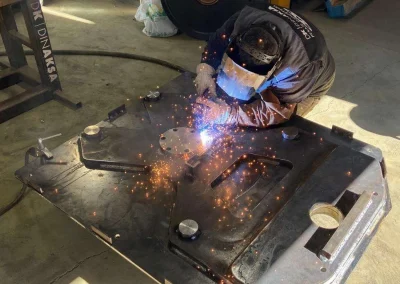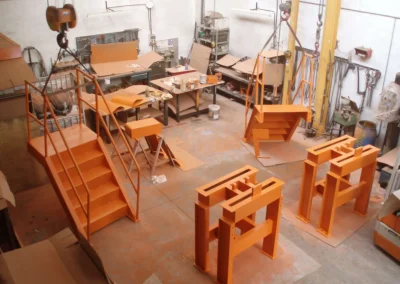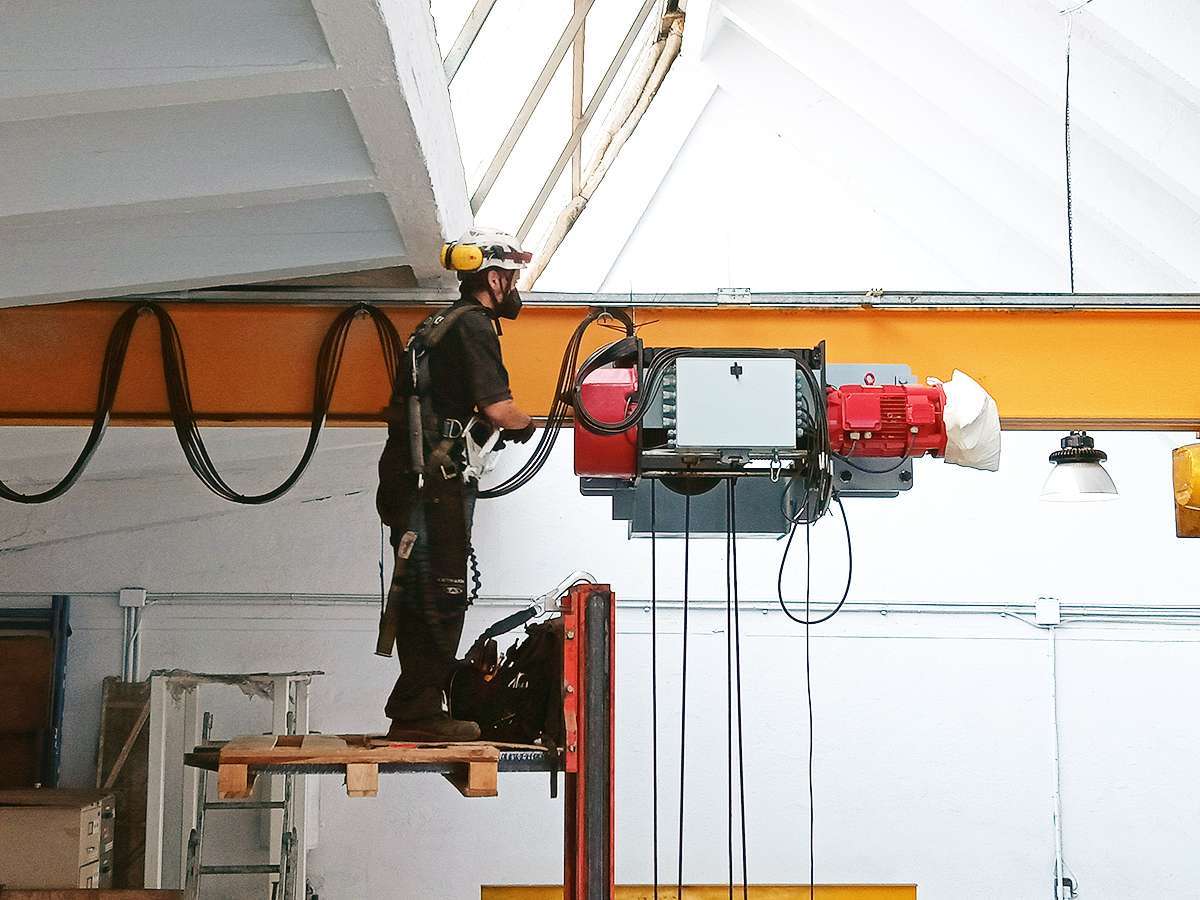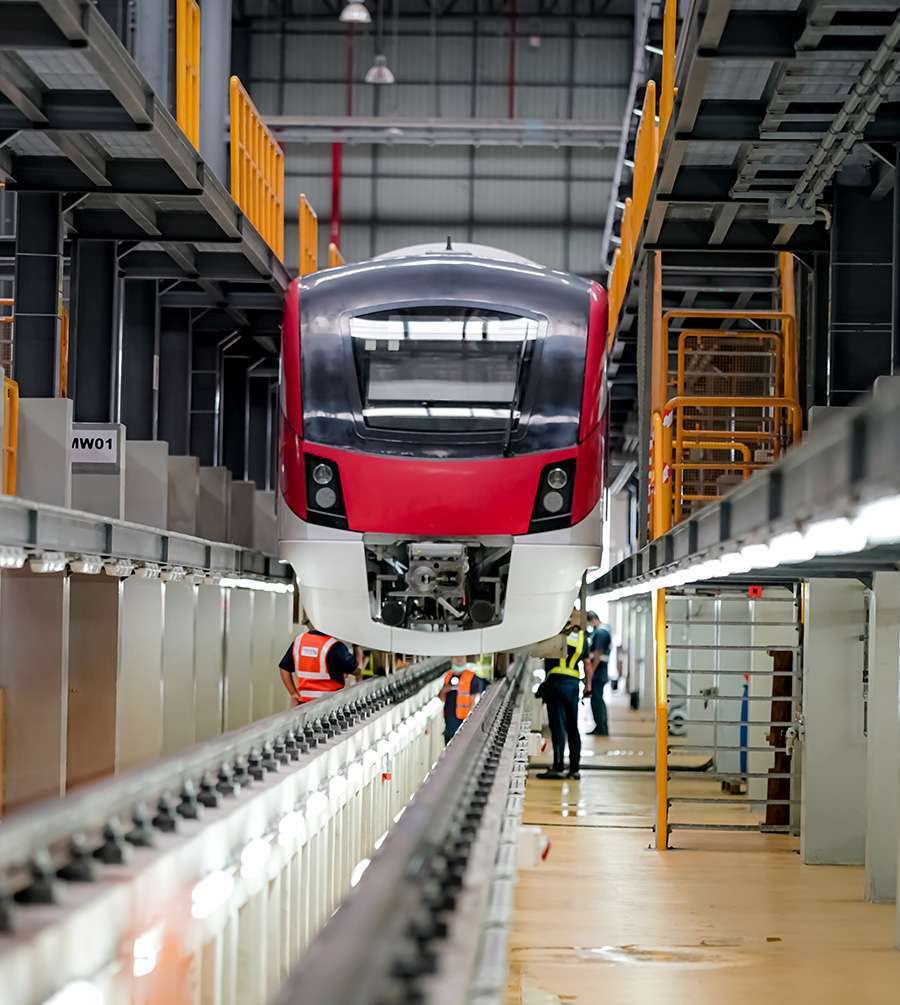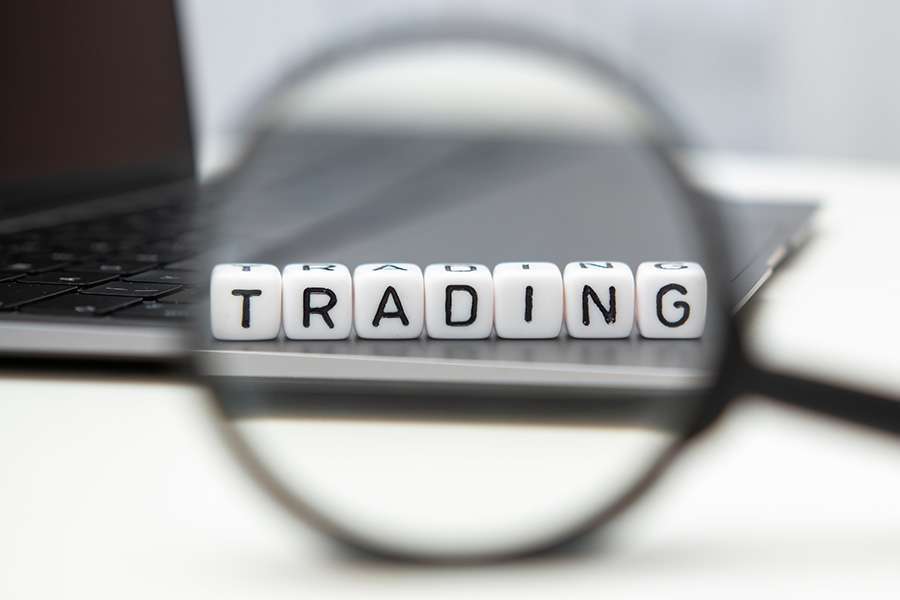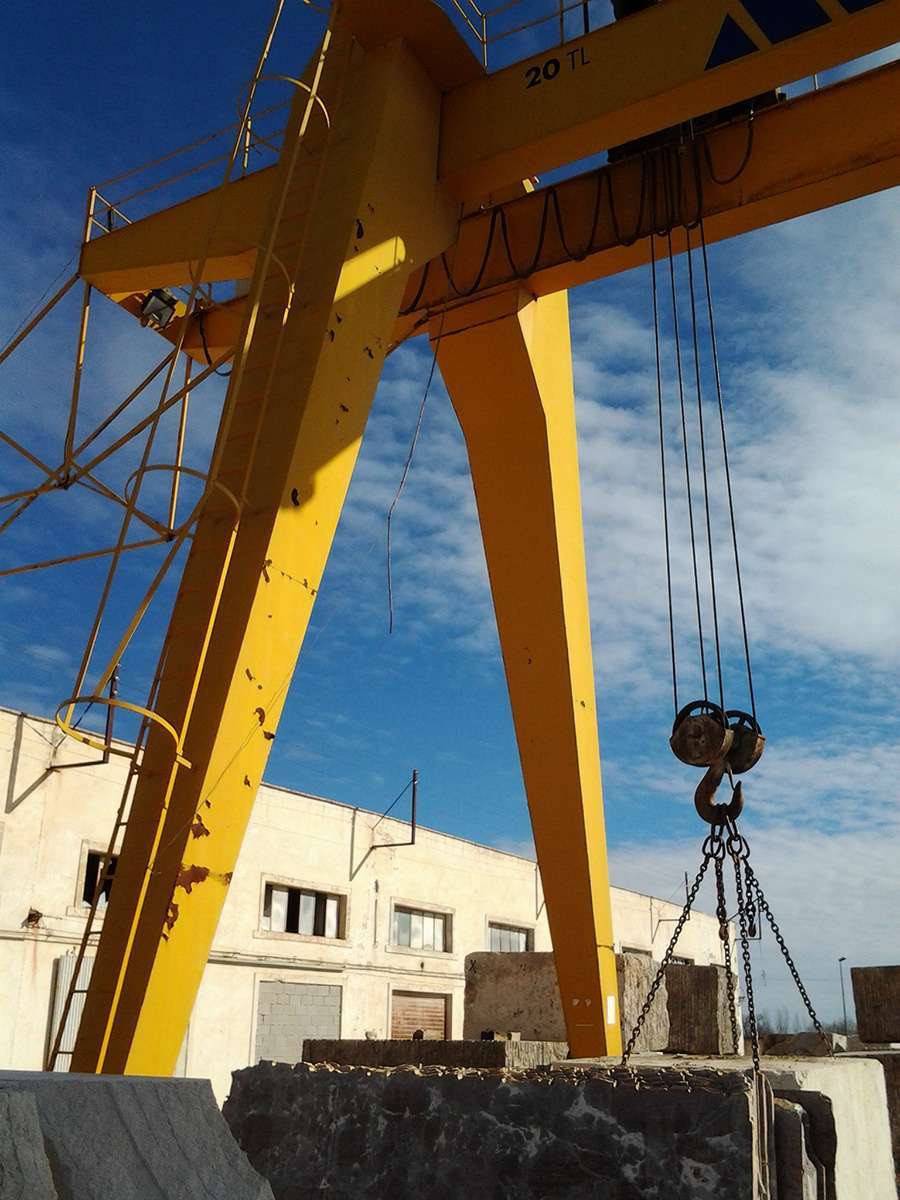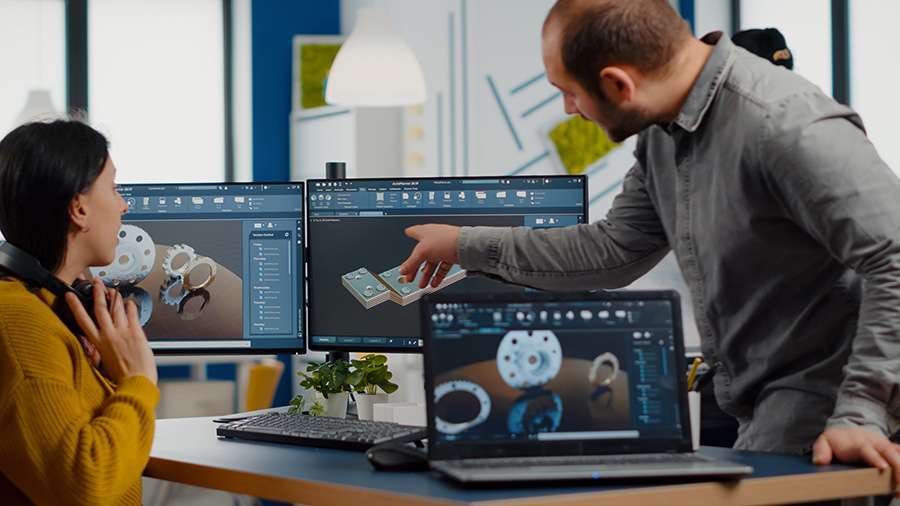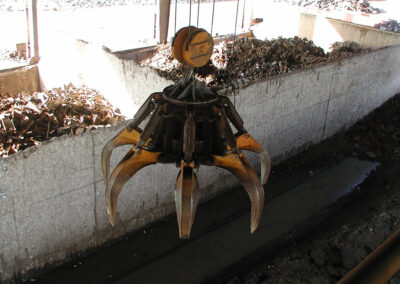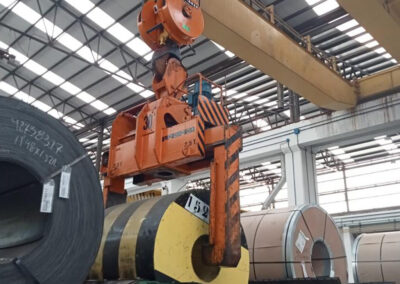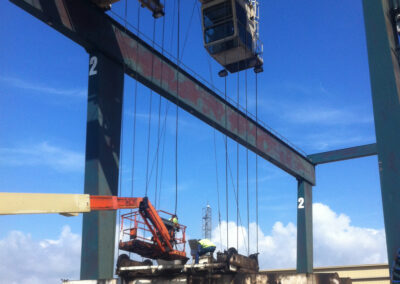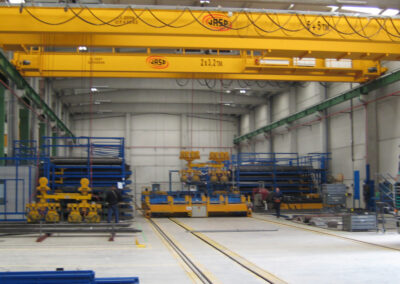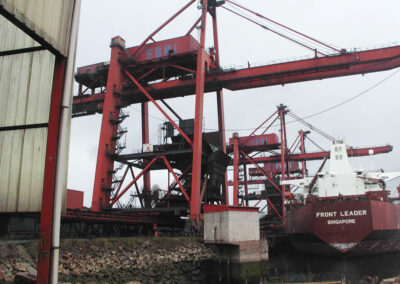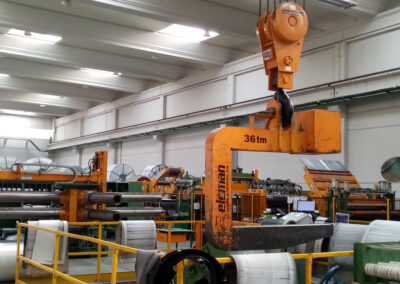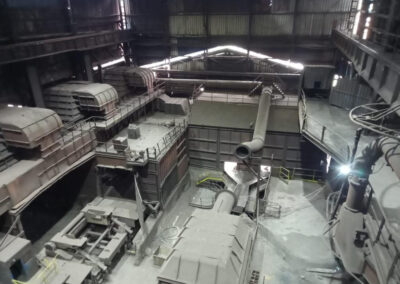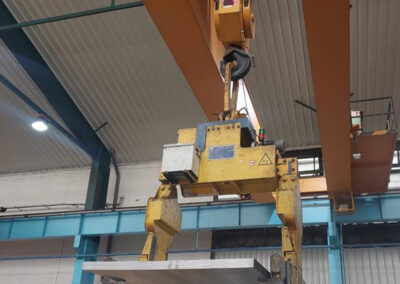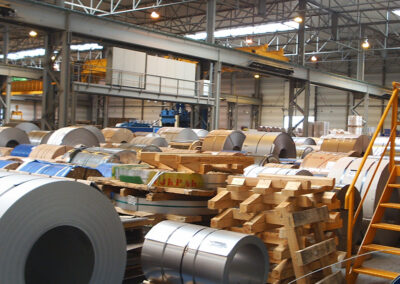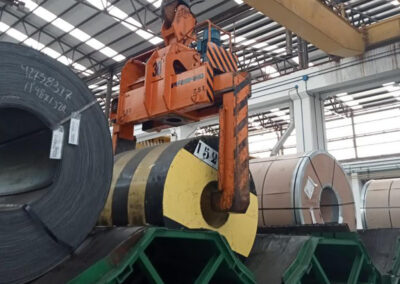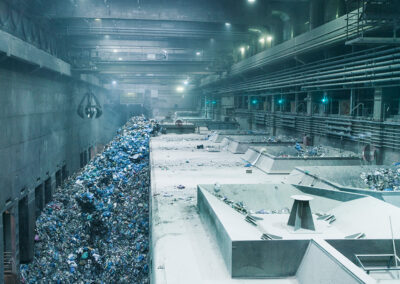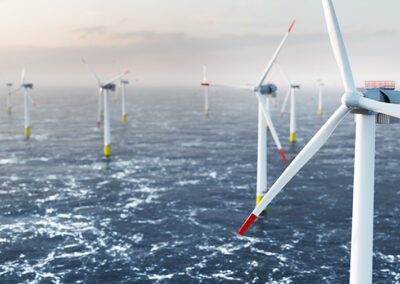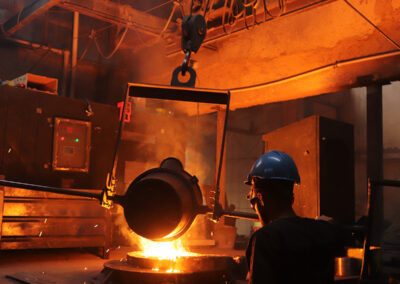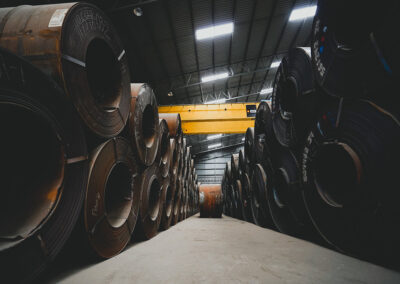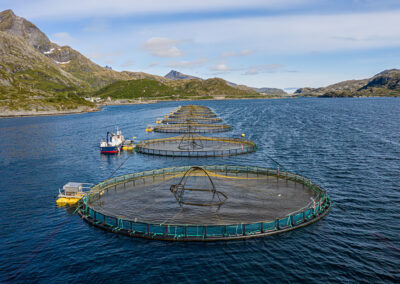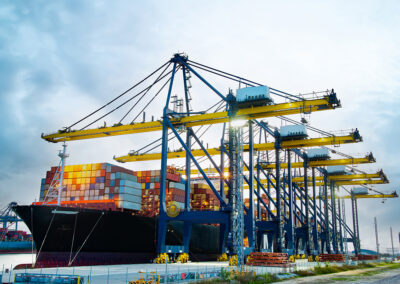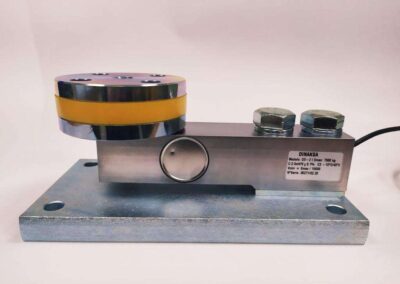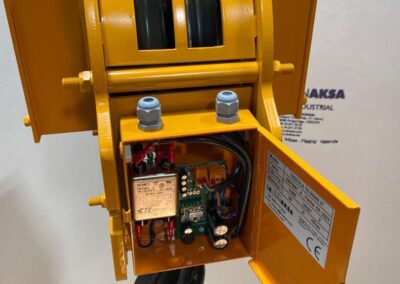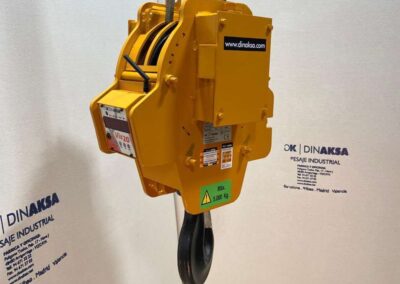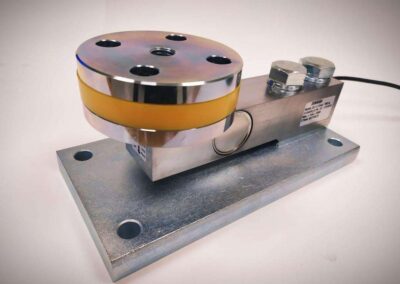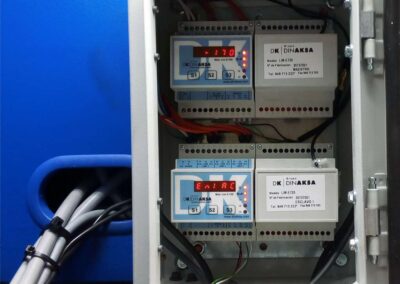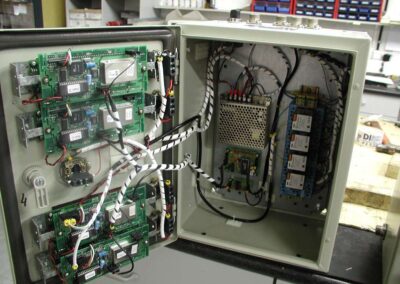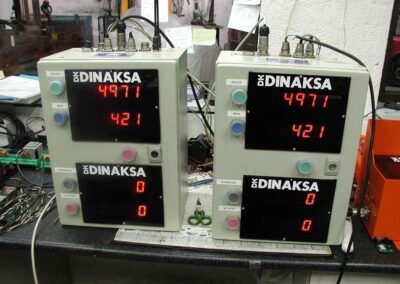Dinaksa
Professionalism and Experience
At DINAKSA we have spent more than 25 years dedicated to thinking, designing, manufacturing and selling equipment with weight and force control as the center of our knowledge and experience and a total orientation to improving the productivity and safety of our clients.
Our products cover a wide range of functionalities, highlighting the following:
- Crane safety systems through control of loads, weights, forces: Black box for recording crane maneuvers, control and limitation of maneuvers that exceed safety limits: inclination, anti-collision between cranes or with objects, overloads due to excess weight, …The equipment records and transmits the signals collected by any means necessary, for display, signaling or subsequent processing of the data integrated into the client’s computer system. The available signal outputs allow managing the crane maneuver when the defined limitations are exceeded
- Weighing equipment for cranes: From hanging equipment such as electronic dynamometers, to weighing systems fully integrated into the crane structure using bolts or load cells, or even in the crane hook. This equipment is in great international demand by reducing the loss of lifting height and allowing the continuous transmission of all data or maneuver records with great precision and accuracy.
- Equipment for handling/transporting heavy loads: electromechanical coil tongs, clamps, rotating plates, rockers, mixed rocker equipment with electromagnets. Custom-made equipment for our clients who seek precision in maneuvers, greater speed in operations and, mainly, greater safety for their workers when handling heavy loads.
As a European company, DINAKSA has always opted to manufacture products according to the highest quality standards, which is why each DINAKSA product is manufactured with materials and components MADE IN EUROPE , and with LOCAL SUPPLIERS . Closeness to our suppliers is a key factor to be able to respond in quality and on time to our Clients’ requests – our reason for being .
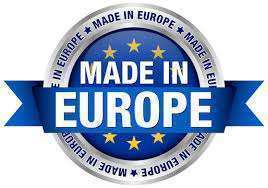
DINAKSA’s activities are specialized technical advice, the design and continuous adaptation of products and services through our engineering team, manufacturing, marketing and installation, and the provision of after-sales maintenance services, rental of weighing equipment and development of customized handling projects. All this in order to achieve the satisfaction of our clients, anticipating and attending to their needs through innovation and continuous improvement.
We have an international vocation, and our products are installed and operating successfully in more than 25 countries around the world, highlighting Germany, the United States, France, Mexico, Brazil and Colombia.
Sectors we work with
Crane and Lifting Industry
Crane maintenance companies
Our main international client is a regional company that offers preventive and corrective maintenance services for cranes of any type in a country.
Our advisory service, installation and maintenance assistance and training will facilitate sales and service to your customers.
Our equipment offers high precision, accuracy and repeatability in the measurements they make. The high quality of the electronic and mechanical materials that make up DINAKSA products will avoid problems with your customers.
Clients often seek to improve their productivity, or increase safety when maneuvering cranes and heavy loads, as well as capture instant information about the maneuvers or weights they handle.
RETROFIT crane services are another very common activity of our main clients, offering solutions to increase safety at work and important improvements in the OEM .
DINAKSA respects its clients by always sending any query received or quote requested to a company or end client located in its geographical area. We always understand that close customer service is the most important thing.
International Merchants/Resellers
DINAKSA receives numerous requests daily from international merchants (distributors, resellers, agents, etc.) to normally acquire products or systems previously defined by their clients.
They tend to be more standardized products at an international level, and with greater ease of use, installation, use and/or maintenance, where the price factor and delivery time are key variables.vvvv
Crane manufacturers
DINAKSA works on demand for crane manufacturers of great international prestige in Europe, the USA and Latin America mainly.
We act as OEM according to the designs and highest engineering standards defined by the crane manufacturer itself.
High precision equipment, measurement accuracy, quality and robustness to operate in the harshest environments and offer a long useful life.
Industrial Engineering
Industrial engineering companies contact us for projects in which they consider it important to control weights, loads, and forces with precision. In contact with our electronic and electromechanical engineers, your professionals will be able to provide alternative solutions or systems.
Our end clients belong to different sectors of activity such as:
In general, our equipment is aimed at any company that uses cranes of all types in its daily operations:
1.- Overhead Cranes: Overhead cranes, also known as overhead cranes or gantry cranes, are typically used in industrial environments such as factories, warehouses, and shipping yards. They consist of a bridge that spans the work area, supported by rails or gantry legs. Overhead cranes can move along rails or gantry legs and lift objects using a lifting system.
2.- Tower Cranes: Tower cranes are common in urban construction projects. They are tall, fixed to the ground and have a vertical mast with a horizontal jib. Tower cranes offer excellent lifting capacities and can reach great heights. They are often used to lift heavy construction materials and equipment up to high-rise buildings.
3.- Floating Cranes: Floating cranes are marine-based cranes that are mounted on barges or pontoons. They are specifically designed for operations near bodies of water, such as ports, harbors, or offshore locations. Floating cranes are used to lift heavy loads onto ships, build offshore structures and other maritime activities.
4.- Telescopic Cranes: Telescopic cranes, also called telescopic cranes or hydraulic cranes, have a telescopic arm that can be extended or retracted using hydraulic cylinders. These cranes offer excellent reach and lifting capabilities. They are often used in construction work, maintenance and infrastructure projects.
5.- Jib cranes: Jib cranes are smaller stationary cranes that consist of a horizontal arm (jib) mounted on a wall or pillar. They are commonly found in workshops, factories and warehouses. Jib cranes provide localized lifting and are ideal for moving materials within a specific area.
6.- Mobile Cranes: Mobile cranes are versatile and widely used in construction sites. They have wheeled or tracked landing gear, allowing them to move easily from one place to another. Mobile cranes can have different configurations, such as rough terrain cranes, all-terrain cranes, truck-mounted cranes, and crawler cranes.
7.- Rough terrain cranes: Rough terrain cranes are designed for off-road operations and are suitable for rough or uneven terrain. They feature large tires or tracks to improve maneuverability on challenging surfaces. These cranes are often used on construction sites, oil fields, and other outdoor applications.
8.- Crawler cranes: Crawler cranes are equipped with tracks instead of wheels, providing stability and mobility in various terrain conditions. They can move smoothly and rotate 360 degrees. Crawler cranes are known for their heavy lifting capabilities and are commonly used in construction, demolition, and infrastructure projects.
Sectors
These are just a few examples of the many types of cranes available. Each type of crane has its own advantages and applications , and its selection depends on factors such as lifting capacity, reach, mobility requirements, and the specific needs of the job or industry.
- Metal
- Scrap handling
- steel production
- Handling of steel, scrap metal, boiler workshop
- Foundry
- Shipyards
- Automotive – Vehicle construction
- Aeronautics
- Railway
- Bulk Material Handling
- Food Industry, Livestock, Fishing and Aquaculture
- Sea ports: container cranes
- Inland ports / Nautical activities
- Renewable energies / Windmills
- Waste recycling, handling of municipal solid waste.
- Construction materials
- Prefabricated construction equipment.
- Mining, quarries, concrete, cement, stone handling.
- The wood and paper industry
- Crane repairs and maintenance.
- mechanical Engineering
- Cargo handling
- Warehouses / Logistics
Some of our reference clients











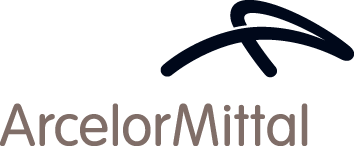
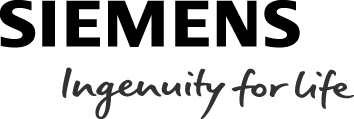
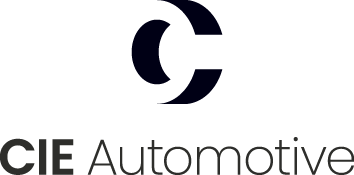
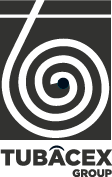

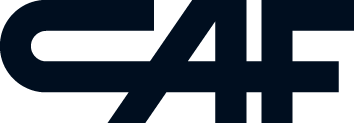



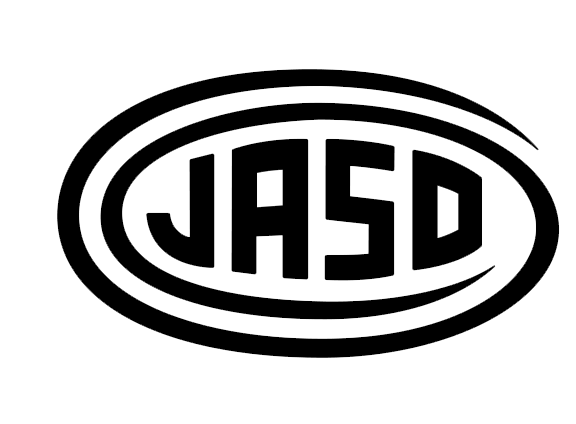
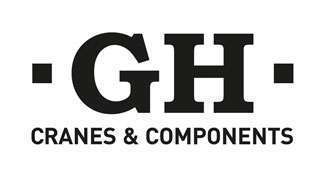
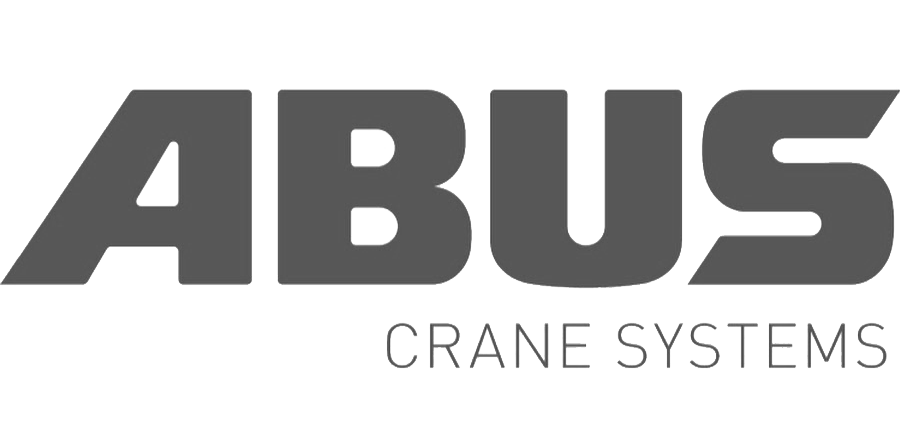
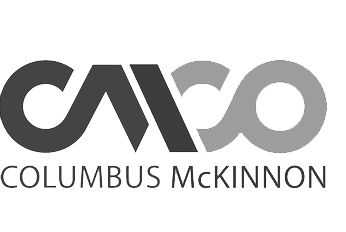
Quality
Daily communication with our clients constantly leads to new projects and new applications for our products, which leads us to constant development and innovation in our equipment and processes.
A large part of DINAKSA ‘s investments and efforts are allocated to the R&D&I department.
As a result of this continuous technological development, the evolution and updating of our weighing systems is constant:
- New features for older computers
- More evolved electronic components.
- Improvements in data/results transmission systems and integration with MRP/Scada or similar systems
- Optimized electronics with lower power consumption, longer battery life and charging speed.
- Energy savings in the manufacturing of DK equipment and waste reduction from manufacturing to recycling at the end of its useful life.
Our team of thinkers is in continuous training, and attending to both internal and external requirements (regulations, specific customer requests, etc.).
SUSTAINABILITY, DECARBONIZATION, PRODUCT LIFE CYCLE MANAGEMENT, ECOPRODUCTION are daily reference points in the study, design, manufacturing or evolution of our products.
As a result of this research and development work, DINAKSA products are at the forefront of the market and enjoy recognized international prestige with annual sales in 25 countries.
CORPORATE STATEMENT
DINAKSA PESAJE is registered in the Metrological Control registry as an authorized manufacturer and repairer of weighing systems with registration number 01-M-042.
DINAKSA PESAJE designs and manufactures all its products in accordance with Directive 89/392/EEC and Supplements 91/368/EEC, 93/68/EEC, 93/44/EEC and 98/37/EEC . This declaration is for all products sold by DINAKSA PESAJE , and it is under our own responsibility that we declare it so.
Corporate Social Responsibility
Health, Safety, Environment and Quality
DINAKSA is committed to ensuring the safety, health, environment and quality (SHEQ) of our workers.
Safety, Health, Environment and Quality (SHEQ)
Our leadership team drives key performance indicators across the group to safeguard employees, customers and the environment.
Our overall approach to continuous improvement means that both customers and colleagues can make the right choice. Our SHEQ and CSR statements. The information contained on this website is for general information purposes only. The information is provided by Dinaksa and while we endeavor to keep the information up to date and correct, Dinaksa makes no representations or warranties of any kind, express or implied, about the completeness, accuracy, reliability, suitability or availability with respect to the site. website or the information, products, services or related graphics contained on the website for any purpose. Therefore, any reliance you place on such information is strictly at your own risk.
In no event will we be liable for any loss or damage including, without limitation, indirect or consequential loss or damage, or any loss or damage whatsoever arising from loss of data or profits arising out of, or in connection with, the use of this website. .
together with the standards of our wider group, they allow us to maintain the highest standards of operational excellence. These are constantly reviewed, to promote a “zero harm” culture throughout the DINAKSA Group.
Working in accordance with the requirements of the Spanish standard , high quality expectations will be achieved through a high level of commitment from all employees. By doing so, we can continually improve safety, health, environmental and quality levels.
FVEM
FVEM members have the ability to produce high quality products and systems ; from the smallest load cell, display and dynamometer to our large or complex weighing or safety devices, often designed and installed to critical tolerances. Over the years, FVEM has developed a number of relevant “Codes of Practice”, which are industry standards. All FVEM members must comply with these standards.
The information contained on this website is for general information purposes only. The information is provided by Dinaksa and while we endeavor to keep the information up to date and correct, Dinaksa makes no representations or warranties of any kind, express or implied, about the completeness, accuracy, reliability, suitability or availability with respect to the site. website or the information, products, services or related graphics contained on the website for any purpose. Therefore, any reliance you place on such information is strictly at your own risk.
In no event will we be liable for any loss or damage including, without limitation, indirect or consequential loss or damage, or any loss or damage whatsoever arising from loss of data or profits arising out of, or in connection with, the use of this website .
Declaration on Modern Slavery
Introduction
This statement is made on behalf of Dinaksa Pesaje SL. It is a declaration made in accordance with section 54 of the Modern Slavery Act 2015 and covers the financial year 2020-21.
Dinaksa Pesaje SL strives to operate with integrity and we recognize our responsibility to be aware of the risks of modern slavery and human trafficking within our own Group and supply chain. Several areas of interest reported last time have been negatively affected by the pandemic, e.g. visits to suppliers that have been impossible to make in person.
About us
Dinaksa Pesaje SL has 2 main sites in Spain. Our staff members perform a variety of roles including compliance, sales, manufacturing, supply chain, technical, finance, IT, human resources and business strategy.
During the pandemic, the use of agency labor was drastically reduced, but as business recovered, more agency labor was used again in our manufacturing areas. This category of people will continue to be part of our ongoing resourcing strategy to support peaks in the production cycle. Individuals are recruited through reputable recruitment agencies and work alongside our core employee population. Again, following the lifting of restrictions on construction type activities, we have more recently had external contractors working on site providing specialist expertise in areas such as installation. We have kept contractors outsourced for logistics and cleaning services. Appropriate right to work checks are carried out in collaboration with these agencies.
Within our direct supply chain, there are around 25 different raw material suppliers. Our indirect supply chain currently consists of more than 300 active suppliers.
We stand by our previous conclusion that the risks of modern slavery and human trafficking being present in our supply chain are low. However, we remain vigilant about the risks and ensure that our suppliers understand and play their role in ensuring that modern slavery and human trafficking do not occur in our organization or supply chains. This message will be reiterated to our suppliers through our procurement teams at each supplier review.
Relevant policies and contracts
To reinforce our commitment to combating slavery and trafficking, we maintain the following policies to guide behaviors and establish standards internal and external to the business:
a) Anti-slavery and human trafficking policy
b) Code of conduct
c) Bribery and corruption policy
Previous revisions to our policies remain relevant, including the Whistleblowing Policy that allows employees to raise concerns through our transparent and accessible reporting process. This supports our employees in making daily ethical decisions, in addition to the specific Anti-Slavery and Human Trafficking Policy already in place.
Our Supplier Assessment Questionnaire includes a specific ethical trading section and applies to all existing suppliers in our supply chain. This checklist asks providers to confirm their position on modern slavery.
We are reviewing the steps we take when engaging with new suppliers, contractors and business partners to ensure they are aware of and comply with our Procurement Standards and Supplier Requirements Policy , which will be launched later this year. These updated processes will allow our procurement team to assess the likelihood that modern slavery or trafficking exists in those organizations and understand what measures are already in place to combat those risks.
Risk assessment processes
We have considered the risk of modern slavery in our own operations and have concluded that the status has not changed and, as a UK employer subject to UK employment protections and practices, we are subject to a low risk.
We continue to use analysis of employee data to highlight any potential cases of possible slavery.
Our suppliers who fall into the following categories will be strongly encouraged to commit and adhere to the emerging review of Dinaksa standards, including;
- Raw material suppliers
- Those involved in the manufacturing of our purchased products.
- Those service providers who support the delivery of our overall customer offering.
We do not consider that the level of modern slavery risk arising from our use of external labor through employment agencies has changed, as our supplier base has remained stable and its internal controls have been sufficiently robust. We have therefore concluded that the risks of modern slavery are low in this area.
Due diligence processes
The company continues to use the Supplier Assessment Questionnaire and we will maintain:
- Our zero tolerance approach to modern slavery;
- Require suppliers to confirm that they will comply with the principles set out in our Procurement Standards and Supplier Requirements policy;
We have had no reason to take corrective action with any supplier over the past year, but we will continue to review their responses to assess due diligence needs and ongoing business partnerships.
Training
The company introduced mandatory online training modules to complement and raise awareness of modern slavery and trafficking, and to educate staff on how our policies and procedures work. All compliance modules will be set up to be completed by each new employee and existing employees every two years.
Our suite of compliance e-learning modules covers Bribery and Corruption, GDPR, Diversity and Inclusion ; which are mandatory courses for all staff.
Measuring effectiveness – performance indicators
During the pandemic, much of management has focused on securing a future for the business and some of the planned actions have not been achieved. This is largely due to the unprecedented world in which we have been operating. However, we intend to continue with the following in the next financial year:
- All employees will have completed relevant training, as mentioned above.
- We will review and republish our anti-slavery and human trafficking policies, whistleblowing and code of conduct for our workforce, setting out our position on modern slavery.
- Additionally, we will reinforce key messages throughout the year through the use of poster campaigns and formal and informal communication channels.
- We will establish a process to gain better oversight of our direct supply chain and consider how best to improve risk assessments, conduct due diligence and communicate with these suppliers in relation to modern slavery and human trafficking issues.
- We will ensure that we continue to update and review our anti-slavery and anti-human trafficking clauses in our contracts with our suppliers.
- We will evaluate and consider the appropriateness of developing additional measures within our risk assessments.
- We’ll review key performance indicators to make sure we’re measuring the right outcome.
This statement has been approved by the Board of Directors of Dinaksa who will review and update it annually.
Declaration on Modern Slavery
Introduction
This statement is made on behalf of Dinaksa Pesaje SL. It is a declaration made in accordance with section 54 of the Modern Slavery Act 2015 and covers the financial year 2020-21.
Dinaksa Pesaje SL strives to operate with integrity and we recognize our responsibility to be aware of the risks of modern slavery and human trafficking within our own Group and supply chain. Several areas of interest reported last time have been negatively affected by the pandemic, e.g. visits to suppliers that have been impossible to make in person.
About us
Dinaksa Pesaje SL has 2 main sites in Spain. Our staff members perform a variety of roles including compliance, sales, manufacturing, supply chain, technical, finance, IT, human resources and business strategy.
During the pandemic, the use of agency labor was drastically reduced, but as business recovered, more agency labor was used again in our manufacturing areas. This category of people will continue to be part of our ongoing resourcing strategy to support peaks in the production cycle. Individuals are recruited through reputable recruitment agencies and work alongside our core employee population. Again, following the lifting of restrictions on construction type activities, we have more recently had external contractors working on site providing specialist expertise in areas such as installation. We have kept contractors outsourced for logistics and cleaning services. Appropriate right to work checks are carried out in collaboration with these agencies.
Within our direct supply chain, there are around 25 different raw material suppliers. Our indirect supply chain currently consists of more than 300 active suppliers.
We stand by our previous conclusion that the risks of modern slavery and human trafficking being present in our supply chain are low. However, we remain vigilant about the risks and ensure that our suppliers understand and play their role in ensuring that modern slavery and human trafficking do not occur in our organization or supply chains. This message will be reiterated to our suppliers through our procurement teams at each supplier review.
Relevant policies and contracts
To reinforce our commitment to combating slavery and trafficking, we maintain the following policies to guide behaviors and establish standards internal and external to the business:
a) Anti-slavery and human trafficking policy
b) Code of conduct
c) Bribery and corruption policy
Previous revisions to our policies remain relevant, including the Whistleblowing Policy that allows employees to raise concerns through our transparent and accessible reporting process. This supports our employees in making daily ethical decisions, in addition to the specific Anti-Slavery and Human Trafficking Policy already in place.
Our Supplier Assessment Questionnaire includes a specific ethical trading section and applies to all existing suppliers in our supply chain. This checklist asks providers to confirm their position on modern slavery.
We are reviewing the steps we take when engaging with new suppliers, contractors and business partners to ensure they are aware of and comply with our Procurement Standards and Supplier Requirements Policy , which will be launched later this year. These updated processes will allow our procurement team to assess the likelihood that modern slavery or trafficking exists in those organizations and understand what measures are already in place to combat those risks.
Risk assessment processes
We have considered the risk of modern slavery in our own operations and have concluded that the status has not changed and, as a UK employer subject to UK employment protections and practices, we are subject to a low risk.
We continue to use analysis of employee data to highlight any potential cases of possible slavery.
Our suppliers who fall into the following categories will be strongly encouraged to commit and adhere to the emerging review of Dinaksa standards, including;
- Raw material suppliers
- Those involved in the manufacturing of our purchased products.
- Those service providers who support the delivery of our overall customer offering.
We do not consider that the level of modern slavery risk arising from our use of external labor through employment agencies has changed, as our supplier base has remained stable and its internal controls have been sufficiently robust. We have therefore concluded that the risks of modern slavery are low in this area.
Due diligence processes
The company continues to use the Supplier Assessment Questionnaire and we will maintain:
- Our zero tolerance approach to modern slavery;
- Require suppliers to confirm that they will comply with the principles set out in our Procurement Standards and Supplier Requirements policy;
We have had no reason to take corrective action with any supplier over the past year, but we will continue to review their responses to assess due diligence needs and ongoing business partnerships.
Training
The company introduced mandatory online training modules to complement and raise awareness of modern slavery and trafficking, and to educate staff on how our policies and procedures work. All compliance modules will be set up to be completed by each new employee and existing employees every two years.
Our suite of compliance e-learning modules covers Bribery and Corruption, GDPR, Diversity and Inclusion ; which are mandatory courses for all staff.
Measuring effectiveness – performance indicators
During the pandemic, much of management has focused on securing a future for the business and some of the planned actions have not been achieved. This is largely due to the unprecedented world in which we have been operating. However, we intend to continue with the following in the next financial year:
- All employees will have completed relevant training, as mentioned above.
- We will review and republish our anti-slavery and human trafficking policies, whistleblowing and code of conduct for our workforce, setting out our position on modern slavery.
- Additionally, we will reinforce key messages throughout the year through the use of poster campaigns and formal and informal communication channels.
- We will establish a process to gain better oversight of our direct supply chain and consider how best to improve risk assessments, conduct due diligence and communicate with these suppliers in relation to modern slavery and human trafficking issues.
- We will ensure that we continue to update and review our anti-slavery and anti-human trafficking clauses in our contracts with our suppliers.
- We will evaluate and consider the appropriateness of developing additional measures within our risk assessments.
- We’ll review key performance indicators to make sure we’re measuring the right outcome.
This statement has been approved by the Board of Directors of Dinaksa who will review and update it annually.

